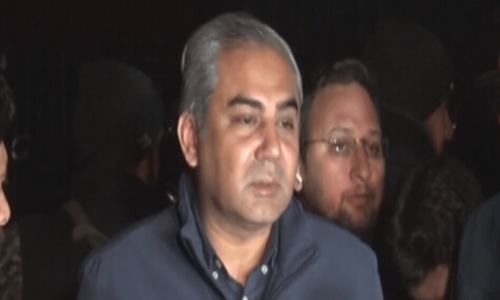
ISLAMABAD: Pakistan should consider establishing ties with Israel, said exiled former Pakistani President Pervez Musharraf, remarks likely to anger many in the Muslim-majority country where he hopes to make a political comeback.
Musharraf, who resigned in 2008 in disgrace, has said he plans to return to Pakistan this month, despite possible arrest, in order to participate in a parliamentary election due by 2013.
On Sunday, he is scheduled to address a rally via video in Pakistan's biggest city and commercial hub, Karachi, sources in his recently formed All Pakistan Muslim League said.
Speaking in favour of relations with Israel could make Musharraf more unpopular, especially among militants who made several attempts on his life with bombings because of his support for the US “war on terror” following the 9/11 attacks.
“There is nothing to lose by trying to get on Israel's good side,” Musharraf, a former army chief, told the liberal Israeli newspaper Haaretz in an interview carried on its website.
“Pakistan also needs to keep readjusting its diplomatic stand toward Israel based on the mere fact that it exists and is not going away.”
Israeli officials were not immediately available for comment on Musharraf's remarks.
CONSPIRACY THEORIES ABOUND Pakistan has been a staunch supporter of demands for a Palestinian state. Pakistan and Israel, however, have maintained covert contacts for decades, officials have said.
According to an October 2009 US diplomatic cable published by WikiLeaks, the head of Pakistan's main spy agency, the Inter-Services Intelligence (ISI), said he had contacted Israel officials to head off potential attacks on Israeli targets in India.
A senior ISI official said the agency has never established any contacts not authorised by the government and which were not in the interests of Pakistan.
Many Pakistanis think Israel and the United States are constantly plotting against Pakistan -- a belief that inspires abundant conspiracy theories.
Musharraf, who came to power in a 1999 coup, said Israel's influence in the United States and its relations with Pakistan's main rival, India, can help Pakistan gain influence abroad.
The first public talks between Israel and Pakistan were held in 2005.
They were described as a “huge breakthrough” by then Israeli Foreign Minister Silvan Shalom, but sparked fury in Pakistan, a nuclear-armed South Asian nation that is home to some of the world's most feared militant groups.
“I felt I needed to test the waters in Pakistan when it comes to Israel,” Musharraf said.
“We have been anti-Israel in Pakistan because of Palestine ... But I believe in realism and in assessing ground realities.”
Musharraf left office, and Pakistan, after his allies lost a 2008 general election and he faced an impeachment motion by the new coalition government for invoking emergency rule and suspending the constitution.
A Pakistani court issued an arrest warrant for Musharraf in February 2011 over accusations that he failed to provide adequate security to former Prime Minister Benazir Bhutto, who was assassinated in December 2007.
Musharraf was declared a fugitive of law after he failed to respond to a court summons.
He has denied suggestions that he, his security agencies, or the military were involved in Bhutto's murder.












































